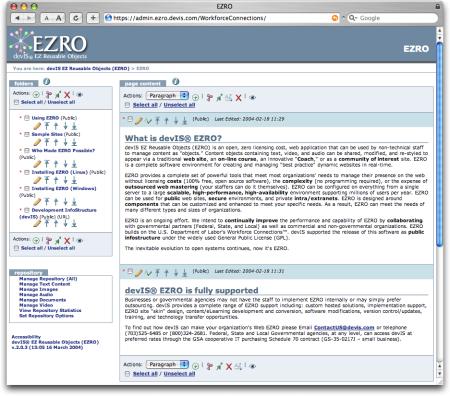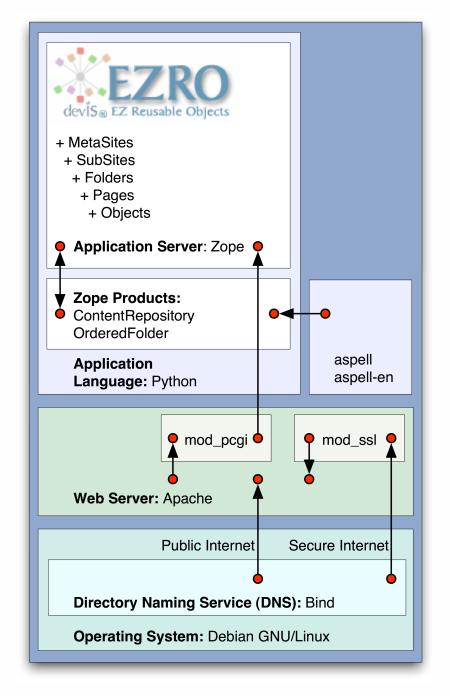Python and Zope in the EZRO Content Management System
| Category: | Software Development, Business, |
|---|---|
| Keywords: | Scalability, Web Development, Web2.0, Aviation, Knowledge Management, Accessibility, Content Management |
| Title: | Python and Zope in the EZRO Content Management System |
| Authors: | Andy J. Williams Affleck and M. Adam Kendall
Development InfoStructure (devIS) |
| Date: | 2004-06-02 |
| Website: | http://ezro.devis.com/ |
| Website: | http://www.devis.com/ |
| Summary: | Python and Zope speed development of devIS EZ Reusable Objects (EZRO), a flexible content management system used in the eGovernment sector |
| Logo: | 
|
Introduction
Development InfoStructure (devIS) is a small consulting firm in Arlington, Virginia that is well known for its work in the eGovernment sector. This includes development of small, medium, and large-scale systems.
devIS EZ Reusable Objects (EZRO) is a content management system which can be used for many different kinds of websites, including traditional information presentation sites such as http://www.devis.com/, portals like http://www.milspouse.org/, training sites like http://cable.devis.com/, and coach style sites. A coaching site appears as a frame on the edge of the screen and drives another site in order to walk the user through that site, as in http://www.careeronestopcoach.org/.
EZRO was the outgrowth of a number of contracts with the Department of Labor over the years from 2001 through 2004. It was developed under the name of Workforce Connections. devIS contributed its copyright to the Department of Labor to allow them to release it as an open source tool in January 2004. EZRO is a more advanced version of the Workforce Connections software that has been released by devIS under the GPL.

EZRO's repository management interface is used to author and manage content for the websites that are based on it Zoom in
Why Python
EZRO was originally developed as the engine to host the Department of Labor's DisabilityInfo portal, originally called Disability.gov, later renamed to DisabilityDirect.gov and now DisabilityInfo.gov. The site is a portal site that is maintained by people in each of the major agencies including the Departments of Labor, Education, Transportation, Defense, Commerce, as well as the Social Security Administration and Health and Human Services. The Department of Labor, the implementing agency, had final editorial authority.
What was needed was a content management system that allowed for distributed editing and centralized editorial control that had to be fully accessible to the disabled. To further complicate things, an Executive Memorandum from President Bush mandated the site go live within sixty days. While some work had already been started and a previous generation of the site existed, there was still an incredibly tight deadline to meet. As the site was to be one of a handful of sites mandated by the White House, it had to be done right the first time.
devIS decided from the start of the project that our code had to meet two general requirements. First, the software should eventually, some time after meeting the initial deadline, be released as open source. Second, it had to be portable enough to run on several platforms.
Python and Zope, a web application server written in Python, were chosen for the work. devIS had been using Zope since 1999 and already had a large staff of developers that were skilled in the ways of Zope, including the owner and developer of ZopeLabs.
At this time devIS was still developing its web applications using Zope's management interface, DTML (dynamic template markup language) tags, and short Python scripts to create dynamic sites. But Zope's management interface was not a good environment for group work: one developer could accidentally overwrite another developer's work with no warning and there was no adequate version control.
With five developers working half-to-full time on this project, it was clear a better solution was needed. The natural conclusion was to start developing in Python using the Products framework available in Zope. A Zope product is a package of code, graphics and templates that provides a piece of reusable web functionality. We were able to combine the integrated pieces of Zope that we loved and used on a daily basis, like user management and simple object publishing to the web, with the flexibility of Python and its large internal library. This also allowed us to keep source code outside of the Zope object database and on the file system, where it could be used with our existing CVS infrastructure for source code control and reporting.

EZRO was developed in Python, as a Zope Product. It interacts with other Zope Products and uses aspell as an external process for spell checking. The content management interface and published web content is provided to its users through Apache or other web server. Zoom in
Implementation
Development of the EZRO content management solution started with the assumption that the application would grow over time, as most software projects do. The initial choice was between producing the software from scratch, or using an already existing framework like the Zope CMF or Plone, both of which were first released around the same time as development was started on EZRO.
After carefully reviewing the alternatives, it was decided that developing a new solution would result in a product more closely tailored to the client's needs and requirements, without the significant overhead incurred by the unneeded parts of CMF or Plone.
Because Python allows for very rapid development, this choice was not at odds with the very tight initial deadline on the DisabilityInfo project. In two weeks, a working prototype was ready to show to the client. The first production quality release of the software only took an additional three weeks, building directly upon the prototype.
By using Python, maintenance overhead was greatly reduced. Over the next year, devIS developers were able to add new EZRO features quickly and easily, in response to requests from the client. As devIS acquired new clients, EZRO was leveraged to reduce development cost of new projects. In this way, the tool grew in features and scale to what it is today.
Python's clean layout and structure also made the code that was released later as open source more readable. This was a boon when bringing new developers on board, as they were able to jump in and understand the code right away.
Because of the cross-platform nature of Python, EZRO runs equally well on Microsoft Windows and any Unix-like operating system, including Linux and MacOS X. devIS has released a self-contained EZRO environment with installer for Windows, and distributes just the EZRO Zope Product in tar archive form for other environments. The software does rely on Zope, Aspell and PyXML, but because of Python's portability, all of these third party applications also run on most other operating systems.
EZRO runs happily on a single machine but is deployed in the devIS production facility on three redundant servers for the public-facing sites, and a fourth secure server for the administrative back-end.
Conclusion
Python and Zope together gave devIS incredible flexibility and allowed implementing new features on a very rapid cycle, which, in turn, has greatly pleased devIS clients. The OSHA Training Institute is using EZRO to develop its training materials and they've informed devIS that they are saving thousands of dollars per day in development costs. As a bonus, the people who use it to develop their courses actually enjoy coming to work and using this tool. In no other set of tools have devIS staff found such ease of implementation.
About the Authors
Andy J. Williams Affleck is the project manager for EZRO and M. Adam Kendall is the lead developer on the project. Andy has an Ed.M. from the Technology in Education program at the Harvard Graduate School of Education and has many years background in creating solutions for online learning and teaching. Adam is the creator of zopelabs.com, holds a BFA in Digital Design, and has over 9 years web programming experience.

